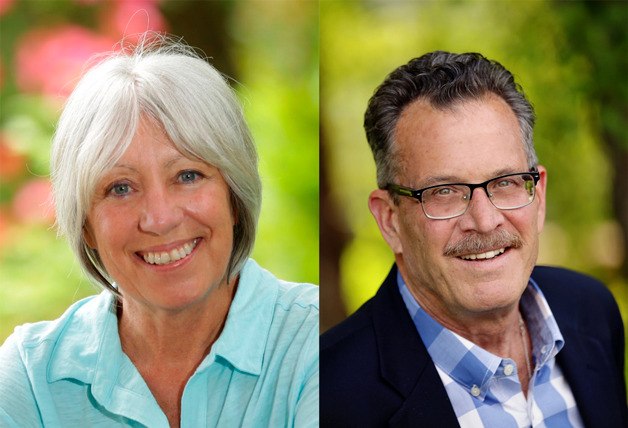Langley’s next four years will be guided by either a retired corporate executive or a nurse-turned home care business owner.
Sharon Emerson and Tim Callison want Langley’s votes, and have made themselves known over the past year. Whoever is voted in next month will face a string of challenges. Aging infrastructure and roads, a desire to see ever more tourism and commerce, residents’ worries over cost of living and utilities bills, and economic development are ahead of the new mayor, a four-year position that pays $55,000 a year plus benefits.
Both candidates said they would treat the position as a full-time job.
The November General Election is Nov. 3. Ballots were mailed out this week. The last day for new Washington voters to register in person is Monday, Oct. 26. Ballots are due on Election Day.
Emerson founded, owned and operated Island Home Nursing for the past three decades. Though successful, she’s in the process of selling the business and stepping away from her lifelong career as an administrator of a home care business.
Callison is a retired executive with plenty of experience in management and training. He volunteered his innovation training to City Hall and South Whidbey school counselors this past year, and joined the Langley Chamber of Commerce and the Langley Main Street Association.
The general election isn’t the first or second time — having advanced from the primary election in July — that they have squared off for a seat at the table of Langley City Hall.
Back in April 2014, they vied for an appointment to the city council. Robin Black, Callison’s wife, was chosen over both of them, but neither Callison nor Emerson lost interest in the affairs of City Hall.
Emerson burst onto the public scene with a persistent and vocal campaign against a proposed funicular. The tram project along the Cascade Avenue bluff had $500,000 in earmarked funding from Island County, but Emerson questioned what needs the city was trying to address with such a project and what data supported such a costly endeavor. She still opposes any permanent infrastructure along the bluff and maintains city-funded golf cart shuttles would be a more effective and adjustable option.
Her objections garnered her a reputation as being against development or change. She said she opposed that project specifically, and was unfairly characterized for it.
“People who characterize it as naysaying characterize it that way because that was the narrative that justified saying it was right,” Emerson said. “I wouldn’t characterize myself that way … (the funicular) simply to my mind wasn’t justified.”
Callison initially liked the project, but has long since changed his position. Having researched its origins and the bluff’s stability problems, he says he would not support a funicular unless community concerns about construction and operating costs, safety and security, and its economic impact were addressed.
“I haven’t seen any data yet that would convince me it would be worth spending a half-million dollars on,” he said.
One of the more recent pressing issues the city has gotten involved in is addressing the rabbit population. Neither candidate was supportive of a city-sponsored lethal solution. From there, however, their opinions differed.
Callison said the non-native bunny boom is a problem for fairgrounds and school district to solve, as those properties seem to be the rabbit epicenter. He also cited a city code regarding public nuisances such as animals. In his opinion, the city may not have much standing to tackle the issue other than requiring property owners to address it, if the city elected to do so.
Outside of that, he wants the city to continue its work with the Port of South Whidbey and Island County, as fairgrounds stakeholders, and the South Whidbey School District.
“There may be some cooperative things the city can do,” he said.
Emerson has championed using city resources such as the website to provide information and options to residents wishing to be rid of rabbits. Purchasing a few live traps, for example, and loaning them out through City Hall could allow for people to remove the feral animals from their property. Or just posting deterrent methods would also be a non-harmful way of keeping them out of yards and gardens.
Over the coming four years, Emerson said one of her priorities would be a focus on the city’s comprehensive plan, and how that should dictate City Hall projects and priorities. Renewing interest in energy sustainability through water conservation and alternative sources such as solar panel incentives or initiatives was a point of emphasis for Emerson. Another way that could shake out, she said, is by having a greater focus on residents’ needs and desires than business.
“We’re already spending large amounts of money on tourism,” she said. “The Chamber and Main Street and the port, all these agencies do a good job promoting tourism and jobs. But the only agency designated to take care of the residents of Langley is the council and mayor.”
Callison said his vision for the next four years was to provide a steady hand over the “big picture” vision and day-to-day management of Langley. Continuing a robust economy that is based on tourism while trying to diversify it with new industry, improving city services through measurement and review for efficiencies, identifying grant funding for capital projects and economic development were identified as his priorities for the office.
“My particular skill set is in strategic execution, which is a methodology of making sure you’re achieving a strategic plan,” Callison said.



